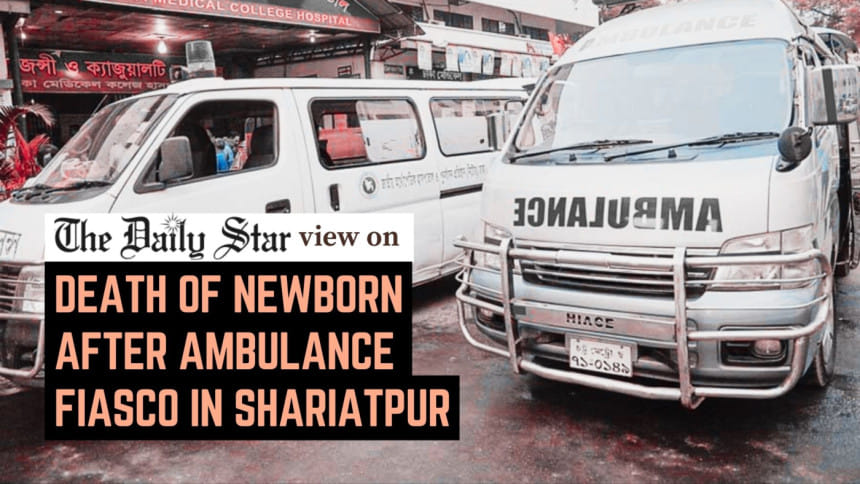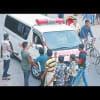Break the grip of ambulance syndicates

We are shocked to learn of the death of a newborn baby in Shariatpur following what appears to be a deliberate obstruction by a syndicate controlling the operation of ambulances. In a country where there is no dedicated lane for ambulances, reports of patients dying in traffic jams are not uncommon, but when a patient dies in an ambulance even before the start of a journey, it is no longer an accident. It is criminal negligence and exploitation deserving of harsh punishment under the law.
According to media reports, the incident happened last Thursday when the newborn, suffering from breathing complications after birth, was being taken to Dhaka following doctors' advice. The family had hired a Dhaka-bound ambulance, but before it could leave Shariatpur town, a group of men linked to the syndicate stopped the vehicle, snatched its keys, and demanded that the patient be transferred to a "local" ambulance charging higher fare. For about an hour or so, the desperate parents pleaded in vain. Ultimately, the baby died inside the ambulance.
This horrific chain of events is anything but isolated, even though their outcome is not always as tragic. Reportedly, Shariatpur's ambulance services have long been held hostage by a group led by the civil surgeon's chauffeur. The superintendent of Shariatpur Sadar Hospital, while talking to this daily, claimed that the ambulance fare for a trip to Dhaka is fixed at Tk 4,000, and anyone charging higher would face disciplinary measures. But syndicate-controlled ambulances routinely charge Tk 6,000-8,000, citing extra "toll fees," despite exemptions granted at highways and even on Padma Bridge. According to a patient, if families try to hire ambulances from other districts at lower costs, they face harassment, delay, and even forced cancellations.
Unfortunately, ambulance syndicates are not unique to Shariatpur. They are common across the country, especially around large government hospitals. These groups include hospital staff, local political actors, and businessmen who either own ambulances or control their operations. Patients are often forced into their chosen vehicles, while "non-local" ambulances are either threatened, or blocked, or extorted. Thus, a vital emergency service has been turned into an illegal enterprise preying on people at their most vulnerable. The influence of these syndicates has been further evident in the aftermath of Thursday's tragedy, as ambulance services at Shariatpur Sadar Hospital have sharply dwindled amid heightened scrutiny, leaving patients at further risk.
We urge the authorities to take stern measures against those responsible for the Shariatpur tragedy. At the same time, the government must break the grip of ambulance syndicates nationwide. There should be a clear national policy for ambulance services with strict fare regulations and effective monitoring to protect patients' rights. No one must die or suffer under such circumstances.


 For all latest news, follow The Daily Star's Google News channel.
For all latest news, follow The Daily Star's Google News channel. 









Comments